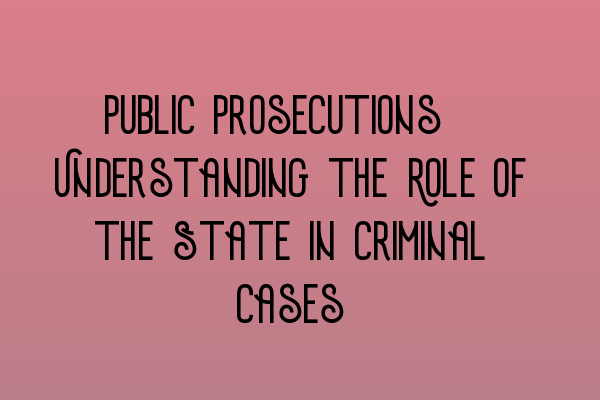Public Prosecutions: Understanding the Role of the State in Criminal Cases
SQE Exam Prep: Essential Study Materials for Aspiring Solicitors
Demystifying the Solicitors Qualifying Examination Format
SQE Exam for International Lawyers: Challenges and Success Strategies
LLC Formation Made Simple: Step-by-Step Guide for UK Entrepreneurs
LLC Formation: A Step-by-Step Guide for UK Entrepreneurs
Introduction
When it comes to criminal cases in the UK, one of the key players is the state. The state acts as the prosecutor and is responsible for bringing criminal charges against individuals who have allegedly committed a crime. This process is known as public prosecutions. In this blog post, we will explore the role of the state in criminal cases, its responsibilities, and the importance of understanding this aspect of the legal system.
The Role of the State
The state, represented by the Crown Prosecution Service (CPS), plays a pivotal role in criminal cases. Its primary responsibility is to initiate and conduct prosecutions on behalf of the public. The CPS is responsible for determining whether there is sufficient evidence to proceed with a case and ensuring that the case is presented effectively in court.
Throughout the criminal justice process, the state acts as the impartial party. It is their duty to seek justice, rather than securing convictions at all costs. This means that the state must consider all available evidence and evaluate its strength before deciding whether to proceed with a prosecution. This safeguards the principles of fairness and due process in criminal cases.
The Process of Public Prosecutions
The process of public prosecutions begins with the police investigation. If the police believe that an individual has committed a crime, they gather evidence and present it to the CPS. The CPS then reviews the evidence and decides whether there is enough to bring charges against the accused.
If the CPS decides to proceed with the case, they will issue a summons or arrest warrant to bring the accused to court. The case will be heard in either the Magistrates’ Court or the Crown Court, depending on the seriousness of the offence. During the trial, the state presents its evidence and arguments, and the defence has the opportunity to challenge it.
It is important to note that the burden of proof in criminal cases lies with the state. The prosecution must prove beyond a reasonable doubt that the accused is guilty of the alleged crime. This reflects the fundamental principle of “innocent until proven guilty” and emphasizes the importance of the state’s role in ensuring justice is served.
The Importance of Understanding Public Prosecutions
Understanding the role of the state in criminal cases is crucial for both aspiring solicitors and individuals involved in the legal system. For aspiring solicitors, having knowledge of public prosecutions is essential for passing exams such as the SQE (Solicitors Qualifying Examination).
If you are preparing for the SQE exam, be sure to check out our article on SQE Exam Prep: Essential Study Materials for Aspiring Solicitors for valuable study materials.
Furthermore, for individuals involved in criminal cases, understanding the role of the state can help ensure that their rights are protected and that they receive a fair trial. It allows them to make informed decisions and work with their legal representatives more effectively.
Conclusion
In summary, public prosecutions play a vital role in the UK criminal justice system. The state, represented by the Crown Prosecution Service, acts as the prosecutor and is responsible for bringing criminal charges against individuals. It is their duty to seek justice and ensure that the prosecution’s case is presented effectively in court. Understanding the role of the state is essential for aspiring solicitors and individuals involved in criminal cases, as it enables them to navigate the legal system more effectively.
For more information on related topics, please refer to the following articles:
Demystifying the Solicitors Qualifying Examination Format
SQE Exam for International Lawyers: Challenges and Success Strategies
LLC Formation Made Simple: Step-by-Step Guide for UK Entrepreneurs
LLC Formation: A Step-by-Step Guide for UK Entrepreneurs
